Describe A Movie You Recently Watched – IELTS Speaking Part 2 & 3
Want to learn how to answer the IELTS Speaking Section for a band 9? Check out the topic on ‘Describe a Movie You Recently Watched - IELTS Speaking Part 2 & Part 3’ along with strategies to score a band 8+ in the IELTS exam.
Table of Contents

Guide to Achieving Band 8+ on IELTS Speaking Cue Cards
In the IELTS Speaking, it is necessary to be familiar with the structure used in IELTS Speaking 2 & 3 since all three parts in the Speaking Section is important to score a band 9. It is necessary to practice with sample tests like, ‘Describe a Movie You Recently Watched - IELTS Speaking 2 & 3’ to be well-versed with the structure in the IELTS exam. With the topic of a movie you watched recently, this is one of the best ways to showcase your ability to share your personal experiences in detail. As a result, practising Movies – Cue Card, like Describe a Film that You Watched Recently, provides a good opportunity to not only express yourself but also demonstrate your fluency and coherence in speech.
Remember to go through the sample answers for Describe a Movie You Recently Watched IELTS Speaking Part 2 and 3 questions with relevant vocabulary. They will help you to be well-prepared to tackle this topic in your IELTS Speaking test and enhance your speaking skills to acquire a band score of 8+.
A Movie You Watched Recently - IELTS Speaking Part 1 Sample Answers
Since the IELTS Speaking Test comprises three parts. Find out what to expect in the actual exam by looking at the Cinema/Films/Movies questions for the IELTS Speaking Part 1. Check out the questions and become familiar with the type of answers you can give to score a band 8+ in the IELTS exam.
Tips to Make Your Speaking Skills Stand Out to Score a Band 8+
In order to score a band 8+ in the IELTS Speaking Section, you can incorporate a few strategies.
- Use Natural Speech: No pauses. Say whatever you have to say, even if you are not sure about the answer, as comfortably as you can. Do not round or attempt to rush; neither shall you deal with a long pause.
- Organize Your Thoughts: Organize your response in a clear thematic manner like introduction, body, argumentation, and then put forward your conclusion because it helps give a more coherent touch with the use of Linking Words for IELTS Speaking Section
- Expand Your Answers: Never just use a single sentence to answer. Always put examples, reasons, or experiences to back up your point so that you can speak for a reasonably long period of time.
- Use difficult or topic-related words and expressions whenever possible. Don’t try to use words you are not familiar with: use words that come naturally to you.
- Clarity is more important than perfection. A very strong accent doesn't get you any score points, as long as your speech remains clear. Remember that Understanding Fluency and Coherence in IELTS Speaking is essential to achieve a higher band score of 8+.
- Instead of giving away vague answers, show examples, experiences, and explanations on a broad scale, so that the examiner can see your speaking potential.
Want to score a band 8+ in the IELTS Speaking? Check out the video below and hone your speaking skills.
Describe a Movie You Recently Watched - IELTS Speaking Part 2
In IELTS Speaking Part 2, you will have exactly one minute to prepare and respond to a specific topic like 'Describe a Movie You Recently Watched'. As you prepare for the IELTS Speaking Part 2 topic on ‘Describe a Film You Watched Recently’, remember to write notes so that you can brainstorm the ideas coherently. Look over the sample answers to get an idea on how to answer similar topics on the Latest IELTS Speaking Cue Card Topics with Samples Answers.
Let’s dive into the topic as you practice and talk about a movie you watched recently! Let’s get started!
Describe a movie that you watched recently.
Include :
- What was it about?
- When and where did you watch it?
- Did you like it? Why?
Describe A Movie You Recently Watched - IELTS Cue Card Sample Answer 1
- When and where did you watch it?
Well, to tell you the truth, I am not a movie buff. However, whenever stultified, I prefer watching something spellbinding, be it a movie or a web series. So, just last week, when I was finding it difficult to sleep at night, I began navigating through the options available on Netflix. And then, I stumbled upon Kodachrome.
- What was it about?
The movie was about Matt, a struggling executive. He found his world going upside down the moment his estranged father’s nurse showed up in his office unexpectedly. Matt’s father, who was a well-acclaimed journalist, was diagnosed with terminal cancer, and his last wish was to go on a road trip with Matt – from New York to Kansas. He wanted to process his last Kodachrome film rolls before closing his lab forever.
- Did you like it? Why?
One of the reasons why I liked this movie is because it is road trip-oriented. The movie speaks largely about relishing the moments of life and never regretting anything. When it comes to movies based on the theme of a road trip, the journey is highlighted better than the destination. And that is exactly what this movie celebrates as well. Right from the presentation to the lessons, the movie is enthralling and hooking till the end.
Shy to start speaking in English? Let us help you boost your skills now! Book a FREE Demo
Describe A Movie You Recently Watched - IELTS Cue Card Sample Answer 2
- What was it about?
Lately, I haven’t had much time to go out for a movie since I’ve been up to my eyeballs in reports and presentations. Hence, to relax and boost, I rented some good old movies and made myself some healthy snacks for a late-night treat. “Silver Linings Playbook” is one of my all-time favorites and I’ve lost count of how many times I watched it.
- When and where did you watch it?
The last time I watched it, was a week ago on Saturday night. I don’t prefer Oscar-nominated movies due to their complexity and lack of entertainment but Silver Linings Playbook was an exception. I’ve always preferred something which was sentimental, light-hearted, yet meaningful and this movie had it all. Silver Linings Playbook was an adaptation of the novel written by Matthew Quick, starring two incredibly talented actors Bradley Cooper and Jennifer Lawrence. This romantic comedy movie is about two wounded souls who find solace again. Pat (Bradley), a former teacher, was just released from a mental institution and was trying to reconcile with his betrayed wife despite his family’s protest. He met Tiffany (Jennifer), a woman with problems of her own, and things got complicated. Two people bearing hidden scars with no hope in the future finally had lights in their lives again.
- Did you like it? Why?
The movie was not heavy at all but extremely entertaining with some laugh-out-loud moments. No matter how many times I watch it, I get emotional every time. The underlying message was also a shout-out to anyone who believed they had hit rock bottom: “When one door closes, another door opens”. Therefore, keep moving forward and don’t lose hope. If anyone runs out of movies to watch, I highly recommend the “Silver Linings Playbook” as a change of appetite.
Describe A Movie You Recently Watched - IELTS Cue Card Sample Answer 3
- What was it about?
I recently watched "Dune," a science fiction film directed by Denis Villeneuve. It is based on the novel by Frank Herbert and is set in a distant future where noble families control planets and battle over a valuable resource known as "spice”. It is quite interesting.
- When and where did you watch it?
I watched "Dune" last weekend at a local cinema. It was an edge-of-the-seat experience to see it on the big screen, surrounded by impressive visuals and sound effects that enhanced the greatness of the film.
- Did you like it? Why?
I really liked the movie as it impressed me with its stunning visuals, intricate storyline, and strong performances by the cast. Denis Villeneuve's direction effectively captured the grandeur and complexity of the original novel, while the actors, especially Timothée Chalamet as the hero, delivered an outstanding performance and moved the movie to the next level!
Grab our best-selling e-book on the IELTS Speaking: Channeling the voice in 30 days before it’s out of stock, for band 9 in IELTS Speaking!
Vocabulary You Can Use to Answer IELTS Speaking Part 2 - Describe a Movie You Recently Watched
Here are some IELTS Vocabulary to use while answering the Describe a movie you watched recently cue card with examples:
- Be up to one’s eyeballs (idiom): to be very busy with something.
Eg: Since the elections are ahead, the party members are up to their eyeballs in preparing for it. - Boost (v): to make something increase, or become better or more successful.
Eg: The addition of electronic gadgets boosted his income from the store. - Lose count: forget how many of something there are, especially because the number is so high.
Eg: There were so many bikes parked that I lost count. - Complexity (n): the state of being formed of many parts; the state of being difficult to understand.
Eg: He understood the complexity of the problem. - Sentimental (a): producing emotions such as pity, romantic love, or sadness, which may be too strong or not appropriate; feeling these emotions too much.
Eg: The ring given by her grandmother has great sentimental value to her. - Light-hearted (a): intended to be amusing or easily enjoyable rather than too serious.
Eg: I prefer watching light-hearted movies rather than action movies. - Adaptation (n): a film/movie, book, or play that is based on a particular piece of work but that has been changed for a new situation.
Eg: The film is an adaptation of Shakespeare’s Romeo and Juliet. - Wounded (a): feeling emotional pain because of something unpleasant that somebody has said or done.
Eg: After being hit by a car, the puppy was badly wounded. - The mental institution (n): a building where people with special needs are taken care of, for example, because they are old or mentally ill.
Eg: Rose sent her grandmother to a mental institution. - Reconcile (v): to make people become friends again after an argument or a disagreement.
Eg: She reconciled with her at the party last night. - Entertaining (a): interesting and amusing.
Eg: Fast and Furious is an entertaining movie. - Underlying (a): important in a situation but not always easily noticed or stated clearly.
Eg: We were not sure about the underlying motives. - Shout-out (n): a message of congratulation, support, or appreciation.
Eg: The influencers gave a shout-out to their fan pages. - Hit rock bottom (idiom): being in the worst possible situation.
Eg: After years of being hospitalized, Meera has hit the rock bottom. - Run out of: (of a supply of something) be used up.
Eg: When I decided to bake a cake, I ran out of cocoa powder.
Describe a Movie You Recently Watched - IELTS Part 3 Follow-Up Questions
Look at the IELTS Speaking Part 3 related to the Describe a Movie You Recently Watched IELTS cue card and develop your own sample answers to be better prepared. Remember that even though there is no time limit in the IELTS Speaking Part 3, you have to follow a structure to answer the questions. Remember to give your opinion along with the justification rather than mentioning your personal experiences.
1. What kinds of films do young people particularly like in your country?
Young people in my country mostly prefer action films, romantic comedies, and fantasy movies. These genres tend to have fast-paced plots, exciting visual effects, and relatable themes such as relationships and adventures. Many viewers also enjoy superhero movies from popular franchises like Marvel and DC because of the spectacular CGI and larger-than-life characters.
Answer Analysis:
This response is clear, relevant, and provides specific examples (action films, romantic comedies, fantasy movies, superhero movies). The answer shows a good range of vocabulary like ‘fast-paced plots’, ‘visual effects,’ and ‘relatable themes’. The inclusion of specific examples from popular culture (e.g., Marvel and DC) helps to strengthen the answer. It is well-developed and demonstrates a good understanding of the question, making it suitable for a higher band score.
2. Do different age groups like the same sort of films now?
In my opinion, different age groups have distinct preferences when it comes to movies. Older generations often appreciate films with deeper themes or historical accuracy, while younger viewers are attracted to visually stunning films with a lot of action. For instance, younger audiences are more likely to enjoy blockbusters, animated films, and thrillers that feature high-tech special effects and gripping story arcs. On the other hand, older viewers tend to enjoy dramas, historical films, or biographies that are more character-driven and have more realistic plots.
Answer Analysis:
This answer is well-structured with a clear distinction between the preferences of younger and older generations. The use of contrast (e.g., 'blockbusters' vs. 'historical films') demonstrates your ability to compare and explain differences. You also include relevant terms like 'character-driven' and 'high-tech special effects', which adds depth.
3. Do you think that certain movies are not meant for each and every age group?
Yes, I believe certain movies are not suitable for all age groups. For example, horror movies or violent action films are often rated for adults due to their graphic content and intense scenes. Young children may be too sensitive to these types of films, which could cause fear or confusion. Similarly, movies with complex themes and philosophical undertones, such as psychological thrillers or art house films, are often more suited for older audiences who can appreciate their nuances.
Answer Analysis:
The answer addresses the question well, acknowledging the inappropriate nature of certain genres for specific age groups. The examples provided (horror, violent action films, psychological thrillers) are clear and relatable. The explanation is logical and well-supported.
4. How would you define a good movie?
A good movie is one that successfully combines an engaging storyline, strong character development, and high-quality cinematography. It should evoke emotions in the audience, whether through humor, suspense, or drama. A good movie often leaves a lasting impression and makes the viewer think about it long after the credits roll. Additionally, excellent performances by the actors, supported by a well-crafted script and direction, are essential components of a memorable film.
Answer Analysis:
This response gives a comprehensive definition of a good movie, focusing on key elements like storyline, character development, cinematography, and emotional impact. The answer is well-organized, covering all the necessary aspects. Phrases such as ‘lasting impression’ and ‘evoke emotions’ demonstrate a strong command of language.
5. Is it important to have famous actors in the movie if the movie wants to be successful?
While having famous actors can definitely help a movie gain attention and attract a larger audience, it is not always necessary for success. Many films have become iconic due to their strong storylines, directing, and cinematography, even without big-name actors. For instance, some indie films or documentaries have gained critical acclaim due to their content and message rather than their star power. However, famous actors often bring credibility to a project, and their star power can generate significant box office revenue, making it easier for a movie to become commercially successful.
Answer Analysis:
This answer provides a balanced view, acknowledging that while famous actors may help attract attention, success also depends on the quality of the movie itself. The use of terms like ‘indie films,’ ‘critical acclaim’, and ‘box office revenue’ adds sophistication to the response. It reflects a deep understanding of the film industry.
6. Do you think that the impact of movies on people is two-fold? Why?
Yes, I believe the impact of movies on people is two-fold. On one hand, films can be a powerful medium for social change—they can raise awareness about important issues such as climate change, gender equality, or human rights. For example, documentary films often highlight real-world issues that provoke discussion and sometimes lead to action. On the other hand, movies can also have negative effects, such as promoting harmful stereotypes, desensitizing people to violence, or encouraging unrealistic beauty standards.
Answer Analysis:
The answer clearly identifies the two-fold impact of movies: promoting social change and potentially causing harm. The examples provided (e.g., documentaries raising awareness, harmful stereotypes in movies) effectively demonstrate your point. The use of terms like ‘social change’ and ‘desensitizing people’ showcases an ability to express complex ideas.
7. In what ways are documentary films and non-documentary films that are only for entertainment different?
Documentary films are typically factual and aim to inform or educate the audience about real events, people, or issues. They often include interviews, real-life footage, and narration to present a truthful representation of the subject matter. In contrast, non-documentary films, especially those made purely for entertainment, are often fictional and focused on providing escapism. These films might include genres such as action, romance, horror, or fantasy, where the plot, characters, and settings are largely imaginative and not based on real events.
Answer Analysis:
This answer draws a clear distinction between documentary and non-documentary films. It effectively uses vocabulary such as ‘factual,’ ‘educate’, ‘escapism’, and ‘fictional’. The explanation is concise yet covers the core differences well.
Vocabulary You Can Use to Answer IELTS Speaking Part 3 Questions on Describe a Movie You Recently Watched
Use the Latest IELTS Speaking Vocabulary to Boost Your Score and achieve an IELTS Band Score of 8+ in the exam while answering the follow-up questions on movies/films. Since vocabulary plays a crucial role in achieveing a band 9 in the IELTS exam, you can learn around 2-3 words a day to use them in different sentences.
Let's check out the list of words which you can use on the topic - movies/films!
- Franchise: a right to sell a company's products in a particular area using the company's name
E.g.: The film franchise was sold to a different company as it was running in losses.
- Larger-than-life character: person attracts a lot of attention because they are more exciting or interesting than most people
E.g.: Everyone in the family is a larger-than-life character and is popular in the community.
- Story arc: the rise and fall of the action in the story
E.g.: The story arc of this movie is very interesting.
- Undertones: a quality of something that you realize exists although it is not expressed directly
E.g.: There are blue undertones in the fabric of the shirt.
- Nuance: very slight difference in appearance, meaning, sound, etc.
E.g.: Mino paid attention to her voice to understand every nuance but failed.
- Cinematography: the art and methods of using cameras in making a movie
E.g.: The cinematography of his recent movies is worth enjoying.
- Leaves a lasting impression: a situation, result, or agreement that continues to exist or has an effect for a very long time
E.g.: His teachings will leave a lasting impression on the listeners.
- Acclaim: to give public approval and praise
E.g.: “Titanic” has won worldwide acclaim.
- Desensitizing: to cause someone to experience something, usually an emotion or a pain, less strongly than before
E.g.: Some people eat extremely spicy food, which leads to desensitizing their taste buds.
- Escapism: a way of avoiding an unpleasant or boring life, especially by thinking, reading, etc. about more exciting but impossible activities
E.g.: Escapism is an important theme of most of her poems.
- Footage: film or videotape that shows a single event or place
E.g.: The footage from the shop’s CCTV helped to find the murderer.
- Blockbuster: a very successful product, film, etc. that makes a lot of money
E.g.: Every year, hundreds of blockbuster films are released all over the world.
We highly believe that the given IELTS cue card topic ‘Describe A Movie You Recently Watched’ with the expert-crafted sample answers would have been of much help. Practice more of the latest 151 IELTS Multilevel Speaking Part 2 & 3 Topics with Model Answers to grab a band 9 in your IELTS Speaking test!
Well done! Improving your speaking skills isn't just about talking confidently. It's also about being clear, using different words, and having good IELTS Grammar. Doing this all alone by practising test papers might be hard.
Struggling with IELTS preparation? Join our expert-led IELTS online classes and achieve your target band score!
Additional Reads
- A Film – IELTS Speaking Practice Test with Sample Answers
- Movies IELTS Speaking Part 2 & 3 Sample Answers
- How to Prepare a Cue Card for IELTS Speaking?
- Common Mistakes to Avoid in IELTS Speaking Test
- 50 Recent IELTS Speaking Topics for Part 2 and 3 for IELTS 2025
- Describe Something You Bought That Was Difficult To Use At First – IELTS Cue Card Sample Answers
- Describe a Person Who Enjoys Cooking for Others – IELTS Cue Card
- Describe a Difficult Challenge That you Completed/Met- IELTS Cue Card
- Describe a Character from a Movie/TV Program/Story – IELTS Cue Card Topic

30 + Difficult IELTS Cue Card Topics with Answer pdf
Explore other Cue Cards
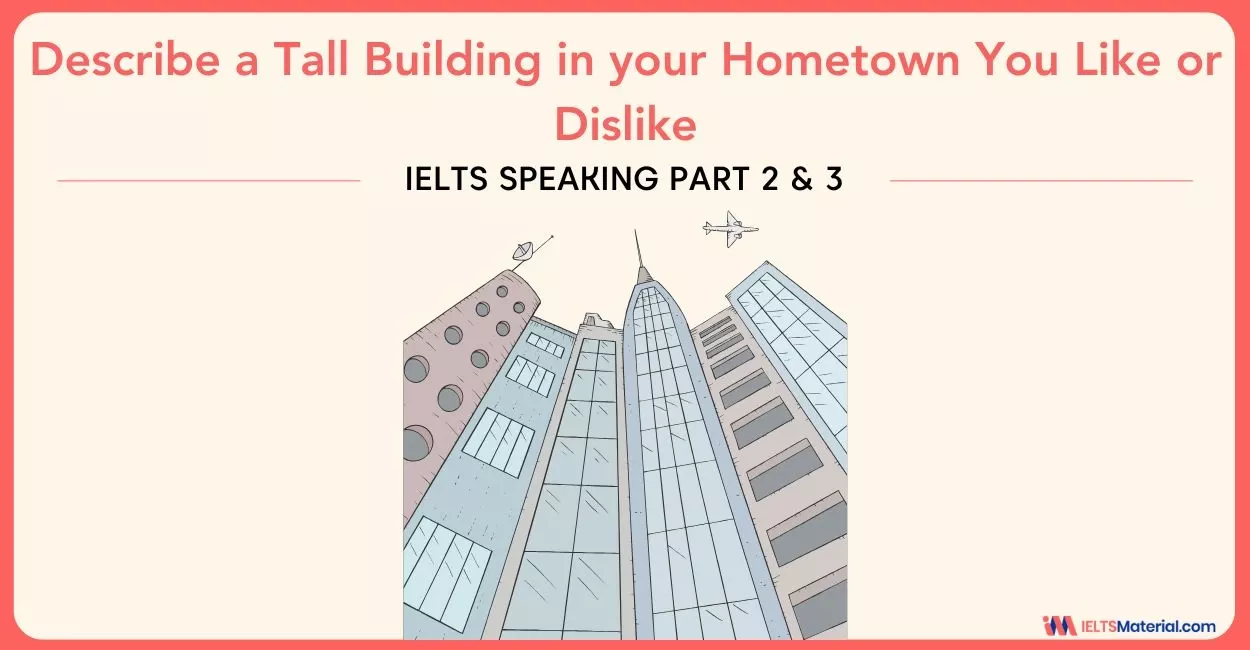
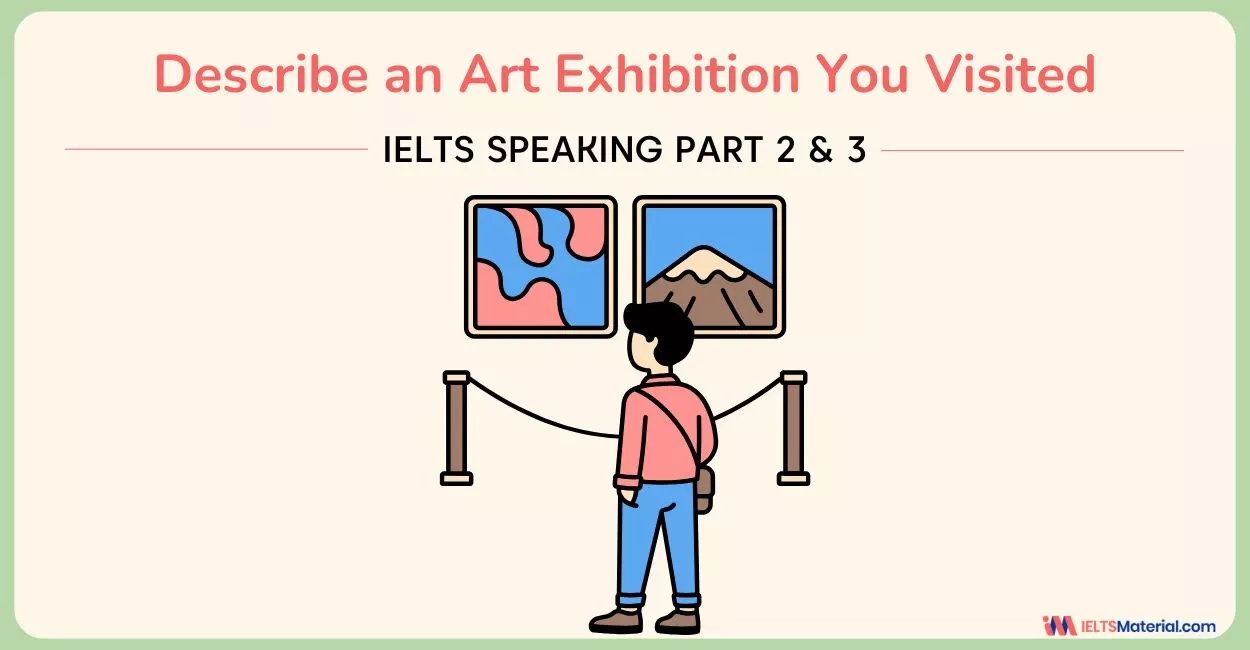
Kasturika Samanta
Recent Articles

Haniya Yashfeen
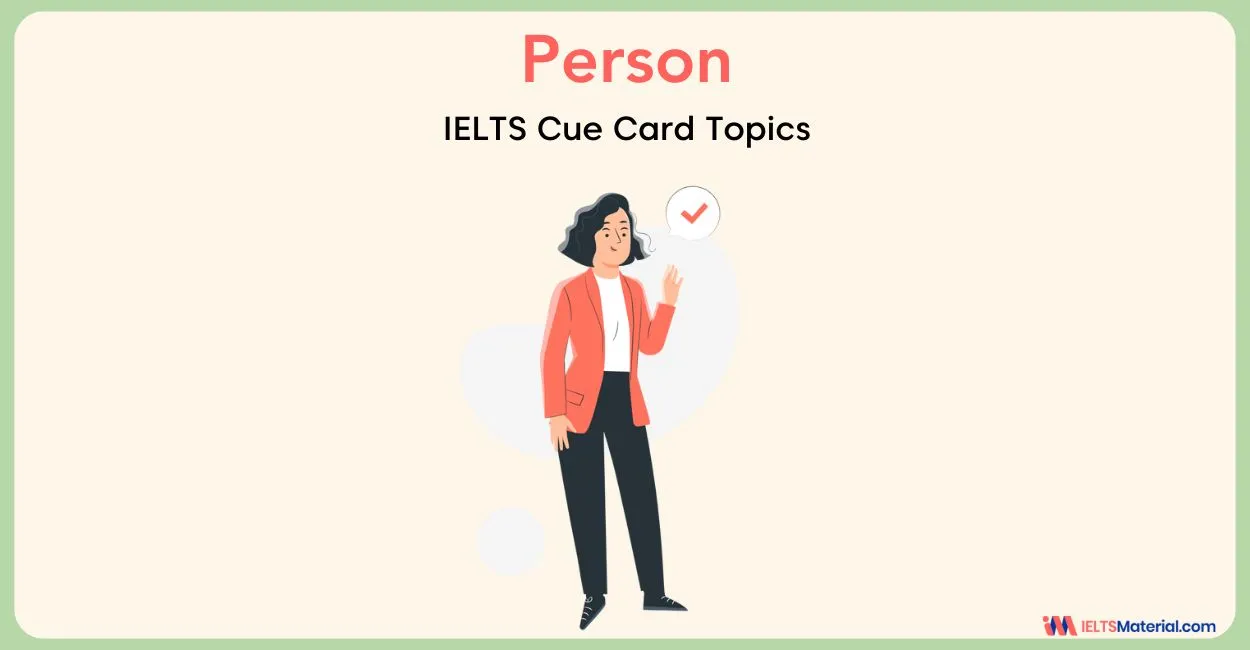
Kasturika Samanta

Nehasri Ravishenbagam


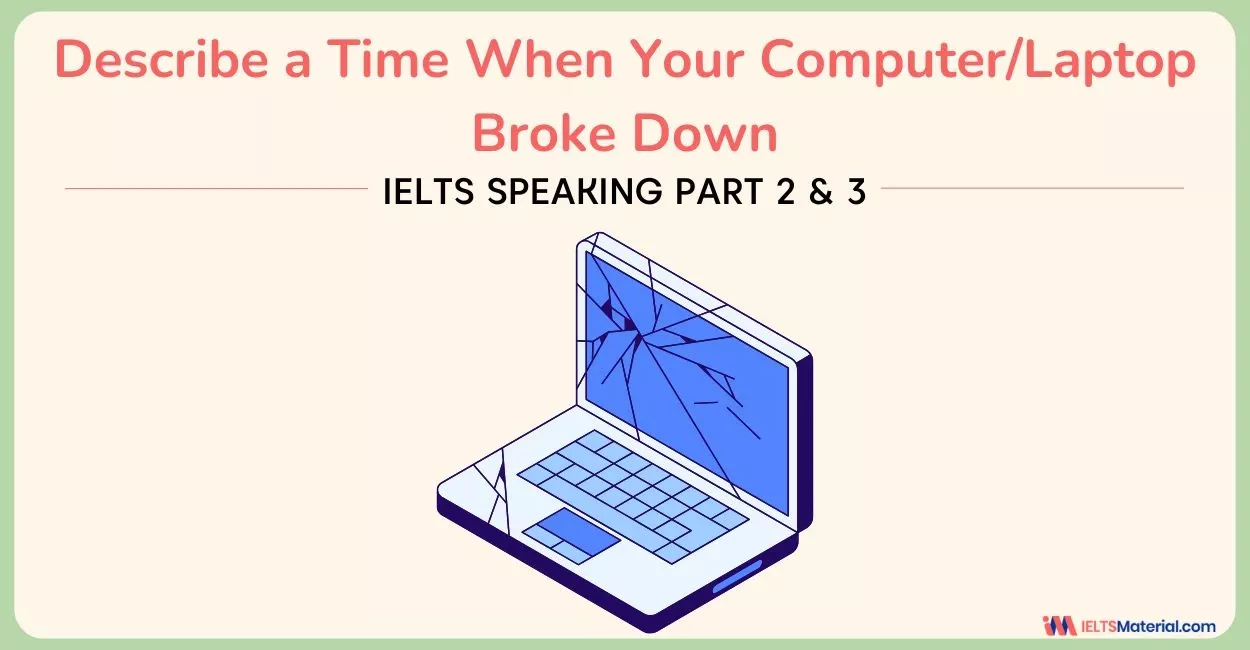

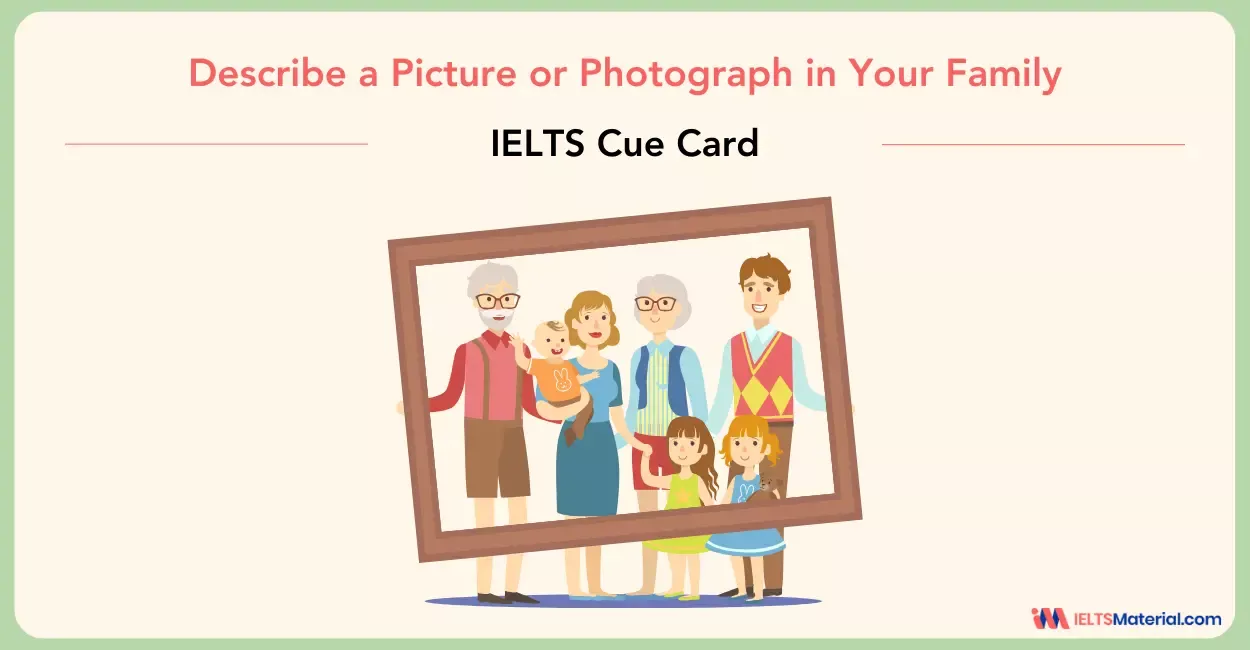


Post your Comments